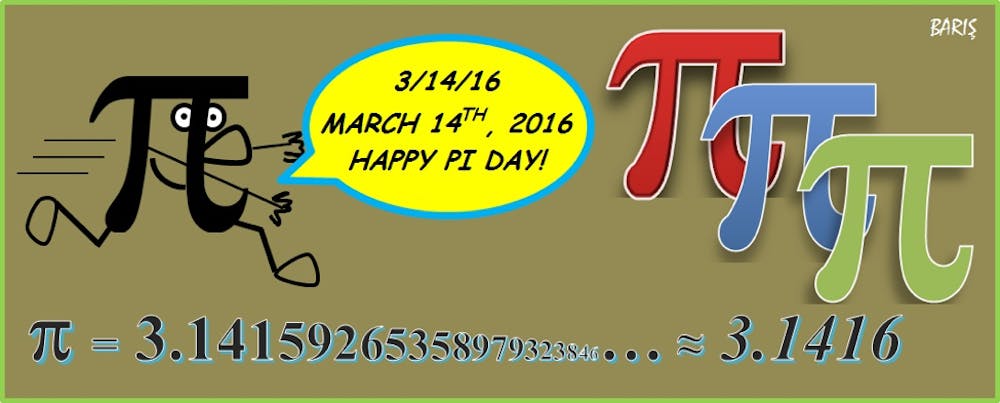by Aziz Inan |
Today’s Pi Day expressed as 3/14/16 is numerically unique because 3/14/16 represents the value of pi “rounded off” to 5 significant digits. Last year’s Pi Day was also unique since 3/14/15 corresponds to the first five digits of pi. Note that both of these special Pi Days are very seldom because they only occur once in a century. Does this mean that one has to wait for about 100 years to experience a numerically unique Pi Day? No worries because the answer is no and here is why.
Interestingly enough, there are other types of numerically unique Pi Days to occur in the 21st century. Recognizing some of them may require the use of basic arithmetic operations.
Here are some examples of numerically special Pi Days to occur in this century:
Pi Day next year, expressed as 3/14/17, will be unique in its own way since 17 equals the sum of the digits of 1592 which constitute the 4th to 7th digits of pi that follow 3.14. (Note also that 17 is 3 plus 14 where 3 and 14 side by side correspond to the first three digits of pi without the decimal point.) The same property also applies to Pi Days 3/14/23, 3/14/28, etc. since the rightmost two digits of the date representing the year number correspond to the sum of the digits of 15926, 159265, etc. which are the digits of pi following 3.14.
Pi Day in 2018 expressed as 3/14/2018 will be numerically unique because 2018 equals the sum of the 1st to 72nd digits of pi added in groups of two digits without the decimal point as 31 + 41 + 59 + … + 40.
Pi Day in 2033 expressed as 3/14/2033 will be special too because 2033 = 15 x 92 + 653 where 15, 92, and 653 side by side constitute the 4th to 10th digits of pi.
Pi Day in 2038 written as 3/14/2038 will be numerically special too since 2038 equals the sum of the 4th to 83rd digits of pi added in groups of two digits as 15 + 92 + 65 + … + 86. Also, 2038 equals twice the sum of the 1st to 36th digits of pi added in groups of two digits as 31 + 41 + 59 + … + 88.
Pi Day in 2042 expressed as 3/14/2042 will also be numerically special. Why? If written as 3142042, this number equals 2 x 17 x 92413. Note that the difference of prime numbers 2 and 17 is 15 which constitute the 4th and 5th digits of pi. The leftmost two digits of 92413 correspond to the 6th and 7th digits of pi and the rightmost three digits of 92413 happen to be the reverse of 314. Isn’t this fun?
Pi Day in 2045 written as 3/14/45 will also be unique since 45 can be interpreted as 1 x 5 x 9, that is, the product of the 4th to 6th digits of pi. (The same property will occur on 3/14/90 because 90 = 1 x 5 x 9 x 2.)
Pi Day in 2056 expressed as 3/14/2056 is made of consecutive digits 0 to 6, each appearing only once.
Pi Day 3/14/2062 is also numerically special. Why? If the first 10 digits of pi without the decimal point are split as 31415 and 92653, the difference of 31415 and the reverse of 92653 (35629) is 4214 and the reverse of 4214, namely 4124, equals twice 2062.
Pi Day in 2065 expressed as 3/14/2065 is also made of consecutive digits 0 to 6, each repeating only once. In addition, 2065 divided by 5 gives 413, which is the reverse of 314.
Pi Day 3/14/66 will also be numerically special since 66 equals 159 + 265 – 358 where these three numbers together represent the 4th to 12th digits of pi.
Pi Day in 2067 written as 3/14/2067 is numerically unique too because 2067 equals half of 159 x 26 where 159 and 26 together constitute the 4th to 8th digits of pi.
Pi Day in 2075 expressed as 3/14/2075 will also be numerically special since 2075 equals the sum of the 1st to 15th digits of pi added in groups of three digits, that is, 314 + 159 + 265 + 358 + 979.
Pi Day 3/14/80 is also numerically unique since 80 equals the sum of the reverses of 15 and 92 which side by side constitute the 4th to 7th digits of pi. Also, 80 equals 159 – 26 – 53 where 159, 26, and 53 side by side represent the 4th to 10th digits of pi.
Pi Day in 2083 written as 3/14/2083 will be special too because 2083 is the 314th prime number.
Pi Day in 2084 expressed as 3/14/2084 will also be unique since 2084 equals 159 + 265 + 358 + 979 + 323 where these five numbers put side by side represents the 4th to 18th digits of pi.
Pi Day in 2094 written as 3/14/2094 is unique too since 2094 equals two thirds of 3141, the first four digits of pi without the decimal point.
So indeed, as listed above, there are many other numerically unique Pi Days to occur in this century. My hope is that by being creative you can also discover other numerically special Pi Days to occur in the 21st century to be added to the above list.
Happy 3/14/16!
Aziz Inan is an electrical engineering professor at the University of Portland. He can be reached at ainan@up.edu.








